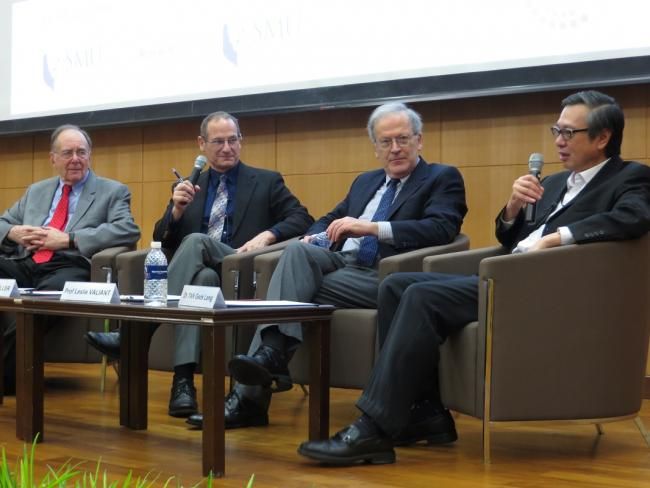
- SMU’s Office of Research and School of Information Systems jointly presented event
- Public lecture held in conjunction with Global Young Scientists Summit (GYSS) Singapore 2016
- Panellists and audience debated and immersed into multiple dimensions
The Singapore Management University (SMU) hosted a panel discussion on 22 January 2016 with two Turing Award winners, Professor Richard Karp and Professor Leslie Valiant, as well as Dr Tan Geok Leng, Senior Fellow at the Agency for Science, Technology and Research (A*STAR), who was formerly Chief Technology Officer of the Infocomm Development Authority.
Moderated by Professor Steven Miller, SMU’s Vice Provost of Research and Dean of the School of Information Systems, the event held at the University’s Ngee Ann Kongsi Auditorium was themed ‘Prospects for Intelligent Machines and Augmented Intelligence’. He opened the session with the intriguing history of Augmented Intelligence (AI), impressing upon guests that AI was born 60 years ago, a fact that some may not have been aware of.
The three speakers then shared their views on the theme through a presentation, which was followed by an engaging panel discussion. The session captivated the 200-strong audience (below), comprising mostly students, along with faculty, industry professionals, members of the community and representatives from government-related bodies.

Both Prof Karp and Prof Valiant are recipients of the prestigious Award touted as the ‘Nobel Prize’ of Computing. They received the Turing Award in 1985 and 2010 respectively. Their remarkable achievements in computing provided some of the important foundations for intelligent machines. This has in turn enabled related abilities of intelligent machines to be further developed and these have contributed to augmenting human intelligence.
Prof Karp is currently a Professor at the University of California, while Prof Valiant is T. Jefferson Coolidge Professor of Computer Science & Applied Mathematics with Harvard University.
The panellists touched on various aspects of intelligent machines, as well as intelligent globally networked systems. Advancements in these machines and systems are pushing the frontiers of integrated human-machine augmented intelligence, and the breakthroughs and developments have profound impact on our future.

Prof Karp (above) shared about deep learning on AI and limitations of AI – its “incompleteness” and “brittleness” at the present state. He believed that the penultimate challenge is understanding and defining our consciousness – without which, humans will be unable to write algorithms that create intelligent machines which can master self-awareness, let alone emulate and function like a human’s mind and emotions. This will be hard to achieve in his and the current generation’s lifetime. He does not believe in the concept of singularity – the moment when machines become smarter than people.
Prof Valiant talked about what can be automated – problems that can be solved routinely by trained humans, and are well-defined by available data. He emphasised that AI is multi-faceted, not one-dimensional, but is no doubt science-based. He too does not think that the concept of singularity will be achieved anytime.
Dr Tan Geok Leng discussed if intelligent machines and AI are boon or bane, citing three scenarios of how people will work with AI in the future – i) where machines of ‘loving grace’ take care of our personal needs, and we are in utopia, ii) intelligent machines are truly enjoyed by only one per cent of the human race, even though everyone has access to it, and iii) human beings become just an energy source for machines, almost like in the movie Matrix. He believed in the second scenario.
The Question and Answer session generated interesting discussion and questions from the audience who were keen to exchange views and seek advice from the world’s best experts in the computing field.
The session was aimed primarily at broadening the vision of students with an interest in computing and information systems – the young talents looking for studies and careers in this field in the future.
The public outreach and education event was put together by SMU’s Office of Research and School of Information Systems. It is a partner event of the GYSS, which is organised by the National Research Foundation of Singapore (NRF).
The GYSS gathers young scientists and researchers as well as eminent science and technology leaders in Singapore to interact at the multi-disciplinary summit, discussing key areas of science and research, technology innovation and society, and solutions to global challenges.
For more information, visit the SMU Panel Session event details or the GYSS 2016 website.
[Featured Photo: SMU Vice Provost (Research) and Dean of School of Information Systems Prof Steven Miller (second from left) moderated the session with the distinguished panellists, Turing Awardees Prof Richard Karp (left) and Prof Leslie Valiant (second from right), and Dr Tan Geok Leng, Senior Fellow at A*STAR.]